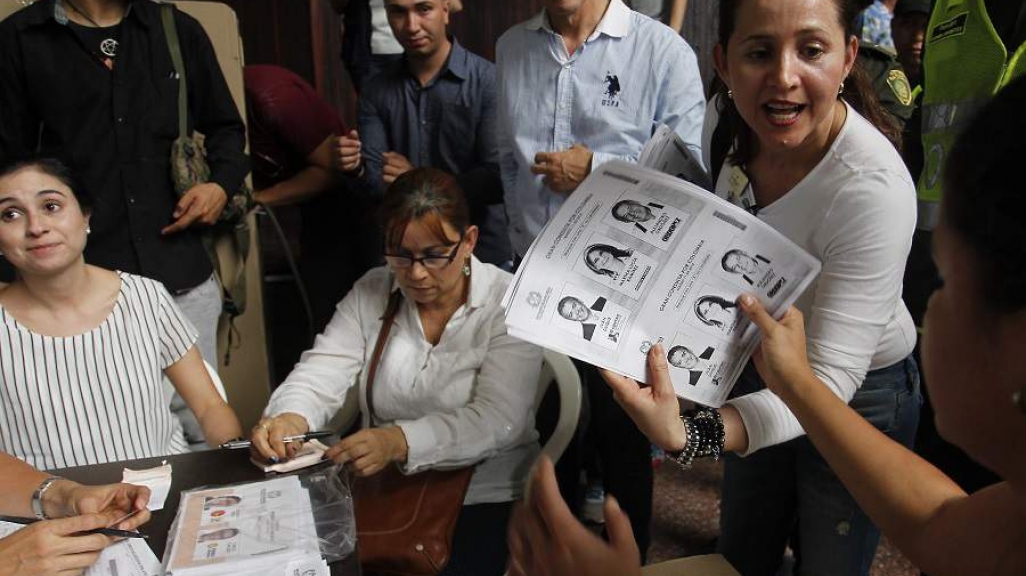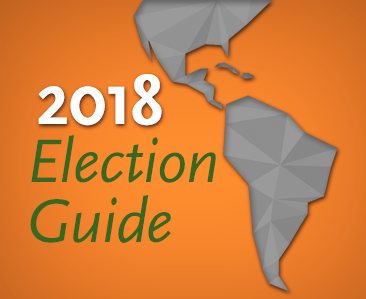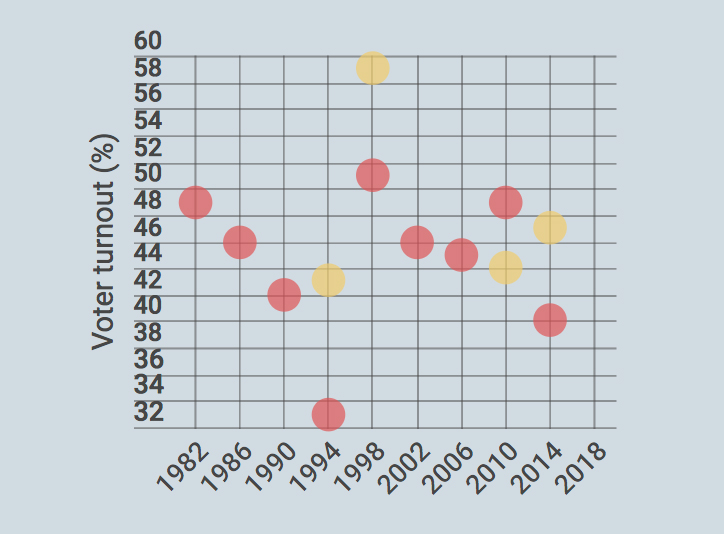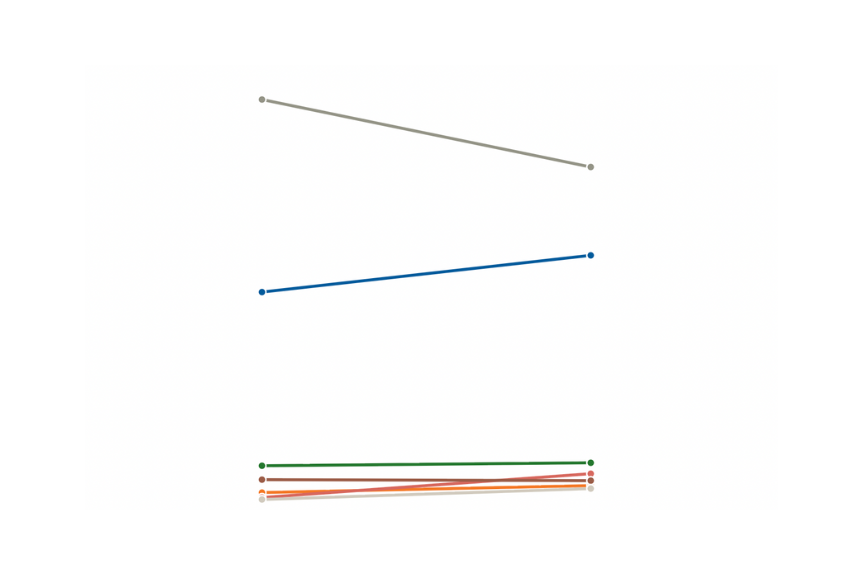Update: Colombian Presidential Race Comes into Focus
Update: Colombian Presidential Race Comes into Focus
Recent legislative elections gave much-needed definition to a crowded field ahead of the May 27 first-round vote.
Colombians technically were voting for 102 senators and 166 representatives on March 11. But the legislative elections helped define a crowded presidential field ahead of the May 27 first-round vote. In the first races in which the FARC (newly reconstituted as a political party) could field candidates, they were trounced, picking up less than 1 percent of votes on Sunday. Here is a look at the four leading candidates to replace President Juan Manuel Santos, their running mates, and strengths and weaknesses, starting from the conservative end of the spectrum.
The candidates
After months of speculation as to who the right-wing coalition’s candidate would be, Bogotá Senator Iván Duque, 41, emerged as the clear winner in a primary ballot with 68 percent of the 6 million votes cast, compared to former Defense Minister Marta Lucía Ramírez’s 26 percent. Of note, Duque, who hails from Álvaro Uribe’s Democratic Center party, received over 4 million votes in the ballot measure, on par with the 3.8 million received by the first-round victor in 2014. That said, the primary was an open one, and thus there could have been many left-leaning Colombians who cast a vote in the conservative ballot but have no intention of voting for Duque in the presidential rounds.
- Strengths: Duque named Ramírez as his running mate on the eve of March 11, giving him claim to both the Democratic Center and Ramírez’s Conservative Party bases. As the most conservative of the four lead candidates, his best hope is if the race polarizes and he ends up against the most leftist candidate, former M-19 guerrilla and ex-Bogotá Mayor Gustavo Petro.
- Weaknesses: While Duque himself is seen as a pragmatic, Uribe and the Democratic Center are seen as more antiestablishment and ideological, which could make it difficult for him to pick up moderate voters who are put off by Uribe’s fear-based messaging. Duque is relatively untested, having only been elected to the Senate in 2014.
In the center-right is former Santos Vice President Germán Vargas Lleras, 56, who was not on a ballot on Sunday, but whose Radical Change party significantly improved its standing in Congress. Doubling its number of senators from eight to 16 for the 2018–2022 session, the party is now the second biggest in Congress after the Democratic Center. On March 9, Vargas Lleras named a former deputy minister of his, Luis Felipe Henao, to serve as his running mate. Henao, who served in both the Uribe and Santos’ administrations is seen as one of the few able to build bridges in a divided and fractured political climate.
- Strengths: Because of Radical Change’s enviable central place on the political spectrum, whoever Colombia’s next president is will need the votes of the party’s substantial bloc in Congress to get anything passed. Vargas Lleras is also expected to pick up a sizeable faction of the more centrist Conservative Party voters.
- Weaknesses: Vargas Lleras’ equivocating support for the peace process while he was a member of Santos’ administration soured many Colombians’ impression of him. His differences with Santos notwithstanding, the former vice president and minister still represents the establishment, old guard of Colombian politics in an era when many voters are looking for change.
Also not on a ballot on Sunday was Sergio Fajardo, 61. But his center-left Colombia Coalition doubled its congressional presence, bringing its Senate seats to 10. The former Medellín mayor and governor of Antioquia is considered the best hope for many centrist Colombians, who are put off by the more extreme platforms of Duque and Petro and are unenthused by Vargas Lleras. Fajardo’s running mate is Claudia López, a popular Green Party senator and a presidential aspirant herself before joining Fajardo’s ticket.
- Strengths: Fajardo has the highest net approval rating of any lead candidate. He is arguably the best positioned in a runoff against Duque, in particular because he left office with high marks and can expect strong support in his (and Uribe’s) home department of Antioquia, which would otherwise be a Democratic Center stronghold.
- Weaknesses: Fajardo faces the challenge of competing with Duque and Petro, whose populist campaigns of fear and mistrust are making gains in the current political climate. He’ll also have one of the more difficult paths to make it to the June 17 runoff, especially in terms of picking up voters from Petro, to whom he’s lost ground recently in polls.
Former Bogotá Mayor Gustavo Petro, 57, was the other victor in the March 11 primaries, winning 85 percent of the left-wing ballot. But that race was much less competitive and he took in 2.8 million votes, well below Duque’s total. Petro has not yet named his running mate.
- Strengths: Petro is an adroit campaigner who has managed to keep his name in the news and stay at the top of Colombia’s (famously unreliable) polls for the better part of the last year. As a congressman in the 2000s, he made a name for himself as an effective voice in the anti-corruption movement, a top priority for voters in 2018.
- Weaknesses: Unlike Fajardo, Petro left office with a dismal approval rating and few tangible achievements. Fajardo and López have both cast Petro in the same extremist light as Duque and Uribe, meaning that if Petro were to make it to the runoff, he might have a difficult time expanding his support base. Petro’s past admiration for Hugo Chávez and Bolivarian calls to rewrite Colombia’s Constitution could provide fuel to the right’s anti-chavista message.
Turnout
Sunday’s vote saw the highest turnout in Colombian legislative elections in decades at 49 percent, up five points from the previous congressional votes. Turnout in a presidential vote has yet to break 50 percent in the twenty-first century. Santos won his first presidential runoff in 2010 with 9 million votes, and then won reelection in 2014 with 7.8 million votes. Uribe notched the highest first-round vote total ever in 2006 when he won an absolute majority with 7.4 million, and was able to stave off a runoff.











